The Dilated Cardiomyopathy Market is estimated to be valued at USD 1.3 billion in 2025 and is projected to reach USD 1.9 billion by 2035, registering a compound annual growth rate (CAGR) of 3.7% over the forecast period.
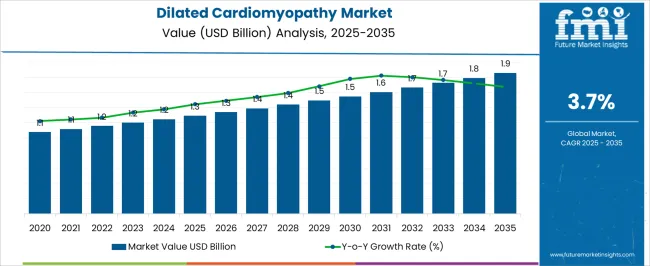
| Metric | Value |
|---|---|
| Dilated Cardiomyopathy Market Estimated Value in (2025 E) | USD 1.3 billion |
| Dilated Cardiomyopathy Market Forecast Value in (2035 F) | USD 1.9 billion |
| Forecast CAGR (2025 to 2035) | 3.7% |
The Dilated Cardiomyopathy market is experiencing steady expansion, supported by the increasing prevalence of cardiovascular disorders and the rising awareness of early diagnosis and treatment. The growing burden of lifestyle-related risk factors, including hypertension, obesity, and diabetes, has been contributing significantly to the rising incidence of dilated cardiomyopathy worldwide. Advances in diagnostic technologies, imaging solutions, and genetic testing have improved early detection rates, supporting patient outcomes and strengthening the demand for therapeutic interventions.
Pharmaceutical advancements, particularly in targeted drug therapies, are shaping the treatment landscape, while healthcare systems are emphasizing cost-effective and long-term management strategies. The market is further influenced by growing investments in cardiovascular research, improved patient access to medications, and enhanced healthcare infrastructure in both developed and emerging economies.
Additionally, increasing collaborations between pharmaceutical companies and research institutions are expected to accelerate drug development pipelines As awareness programs and clinical trials continue to highlight treatment efficacy, the Dilated Cardiomyopathy market is poised for sustained growth, with innovative therapeutic options and robust distribution networks driving adoption globally.
The dilated cardiomyopathy market is segmented by drug class, distribution channel, and geographic regions. By drug class, dilated cardiomyopathy market is divided into Angiotensin-Converting Enzyme (ACE) Inhibitors, Angiotensin II Receptor Blockers, Beta Blockers, Diuretics, Blood Thinning Medications, and Cardiac Glycosides. In terms of distribution channel, dilated cardiomyopathy market is classified into Retail Pharmacies, Online Pharmacies, Hospital Pharmacies, and Mail Order Pharmacies. Regionally, the dilated cardiomyopathy industry is classified into North America, Latin America, Western Europe, Eastern Europe, Balkan & Baltic Countries, Russia & Belarus, Central Asia, East Asia, South Asia & Pacific, and the Middle East & Africa.
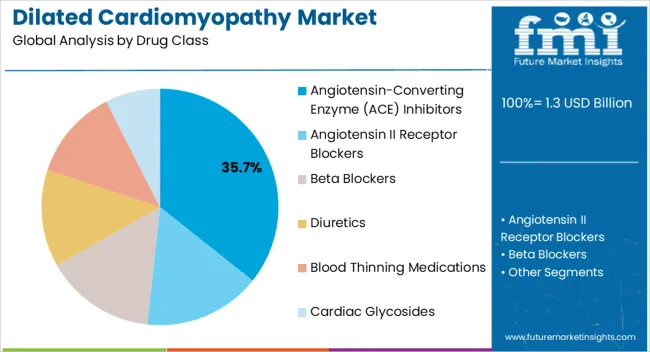
The Angiotensin-Converting Enzyme (ACE) inhibitors drug class segment is projected to hold 35.7% of the market revenue share in 2025, positioning it as the leading therapeutic class. This dominance is attributed to the proven effectiveness of ACE inhibitors in reducing mortality and morbidity rates among patients with dilated cardiomyopathy. These drugs play a critical role in managing heart failure symptoms, improving cardiac output, and preventing further progression of the disease.
The affordability, widespread clinical adoption, and established safety profile of ACE inhibitors have strengthened their market position. Additionally, their ability to be used in combination therapies enhances treatment efficacy and expands clinical applications. With the growing number of patients requiring long-term disease management, ACE inhibitors remain a preferred choice among healthcare providers.
Continuous updates in treatment guidelines recommending ACE inhibitors as first-line therapy are further reinforcing their demand As patient awareness and access to healthcare improve globally, the segment is expected to maintain its leadership, supported by strong clinical evidence and consistent therapeutic benefits.
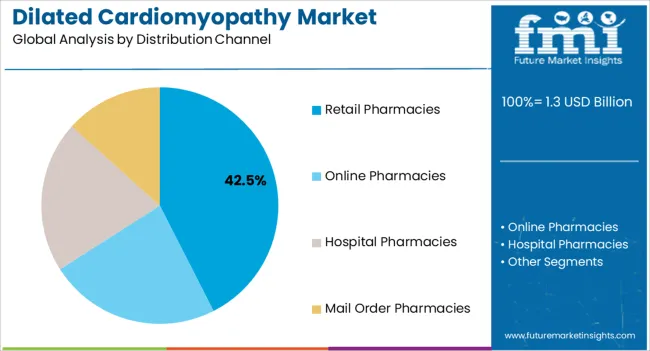
The retail pharmacies distribution channel segment is expected to account for 42.5% of the market revenue share in 2025, making it the leading channel for drug distribution. Retail pharmacies play a crucial role in ensuring accessibility and affordability of dilated cardiomyopathy therapies, particularly in regions where hospital-based treatments are less accessible. Patients prefer retail pharmacies due to convenience, wide availability of medications, and the ability to obtain both generic and branded drugs with ease.
Moreover, the growing trend of patient-centered care and chronic disease management has positioned retail pharmacies as essential points for long-term treatment adherence. Many retail chains are expanding their offerings with counseling services and digital platforms, enabling better patient engagement and medication tracking.
The segment is further supported by the increasing penetration of retail pharmacy networks in emerging economies, where healthcare infrastructure is developing rapidly As the global demand for cardiovascular medications rises, retail pharmacies are expected to remain the primary channel, reinforced by accessibility, affordability, and expanding distribution networks.
Dilated cardiomyopathy is condition caused due to enlargement of left ventricle in the heart. In this state left ventricle gets enlarged, and the heart walls become thinner to pump blood from heart to other body parts of the body.
Dilated cardiomyopathy can be developed at any age however it is more common in the people age between 20 to 60 years. In some cases, right ventricle also might be affected due to myopathy. Dilated cardiomyopathy is often caused by genetic mutations and non-genetic conditions like exposure to toxins, autoimmune diseases, heart valve abnormalities and diabetes disease conditions.
However, there was no drug approved by FDA to treat dilated cardiomyopathy conditions. Companies are actively working on to develop molecules to treat dilated cardiomyopathy conditions. Array BioPharma carrying out Phase 2 clinical trial for ARRY-797 that inhibits p38 mitogen-activated kinase inhibitor to treat dilated cardiomyopathy.
In December 2025, USA FDA gave Orphan drug status to the Vasomera (PB1046) molecule developed by PhaseBio Pharmaceuticals that is used treat X-linked dilated cardiomyopathy conditions. Vericel Corporation working on innovative concept to treat dilated cardiomyopathy conditions.
Company has developed Ixmyelocel-T, multicellular therapy to treat dilated cardiomyopathy.
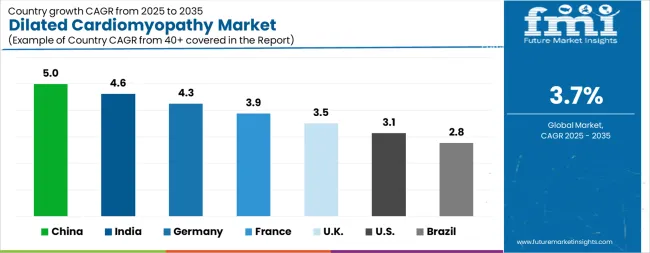
| Country | CAGR |
|---|---|
| China | 5.0% |
| India | 4.6% |
| Germany | 4.3% |
| France | 3.9% |
| UK | 3.5% |
| USA | 3.1% |
| Brazil | 2.8% |
The Dilated Cardiomyopathy Market is expected to register a CAGR of 3.7% during the forecast period, exhibiting varied country level momentum. China leads with the highest CAGR of 5.0%, followed by India at 4.6%. Developed markets such as Germany, France, and the UK continue to expand steadily, while the USA is likely to grow at consistent rates. Brazil posts the lowest CAGR at 2.8%, yet still underscores a broadly positive trajectory for the global Dilated Cardiomyopathy Market. In 2024, Germany held a dominant revenue in the Western Europe market and is expected to grow with a CAGR of 4.3%. The USA Dilated Cardiomyopathy Market is estimated to be valued at USD 445.6 million in 2025 and is anticipated to reach a valuation of USD 607.3 million by 2035. Sales are projected to rise at a CAGR of 3.1% over the forecast period between 2025 and 2035. While Japan and South Korea markets are estimated to be valued at USD 68.2 million and USD 35.2 million respectively in 2025.
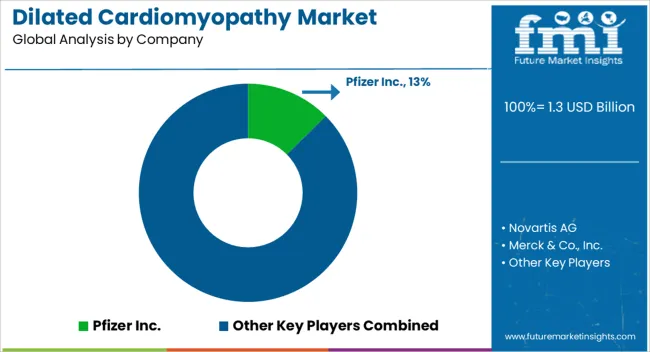
| Item | Value |
|---|---|
| Quantitative Units | USD 1.3 Billion |
| Drug Class | Angiotensin-Converting Enzyme (ACE) Inhibitors, Angiotensin II Receptor Blockers, Beta Blockers, Diuretics, Blood Thinning Medications, and Cardiac Glycosides |
| Distribution Channel | Retail Pharmacies, Online Pharmacies, Hospital Pharmacies, and Mail Order Pharmacies |
| Regions Covered | North America, Europe, Asia-Pacific, Latin America, Middle East & Africa |
| Country Covered | United States, Canada, Germany, France, United Kingdom, China, Japan, India, Brazil, South Africa |
| Key Companies Profiled | Pfizer Inc., Novartis AG, Merck & Co., Inc., Bristol-Myers Squibb Company, Johnson & Johnson, Sanofi S.A., GlaxoSmithKline plc, AstraZeneca plc, Eli Lilly and Company, Bayer AG, AbbVie Inc., Amgen Inc., Gilead Sciences, Inc., Roche Holding AG, and Takeda Pharmaceutical Company Limited |
The global dilated cardiomyopathy market is estimated to be valued at USD 1.3 billion in 2025.
The market size for the dilated cardiomyopathy market is projected to reach USD 1.9 billion by 2035.
The dilated cardiomyopathy market is expected to grow at a 3.7% CAGR between 2025 and 2035.
The key product types in dilated cardiomyopathy market are angiotensin-converting enzyme (ace) inhibitors, angiotensin ii receptor blockers, beta blockers, diuretics, blood thinning medications and cardiac glycosides.
In terms of distribution channel, retail pharmacies segment to command 42.5% share in the dilated cardiomyopathy market in 2025.






Our Research Products

The "Full Research Suite" delivers actionable market intel, deep dives on markets or technologies, so clients act faster, cut risk, and unlock growth.

The Leaderboard benchmarks and ranks top vendors, classifying them as Established Leaders, Leading Challengers, or Disruptors & Challengers.

Locates where complements amplify value and substitutes erode it, forecasting net impact by horizon

We deliver granular, decision-grade intel: market sizing, 5-year forecasts, pricing, adoption, usage, revenue, and operational KPIs—plus competitor tracking, regulation, and value chains—across 60 countries broadly.

Spot the shifts before they hit your P&L. We track inflection points, adoption curves, pricing moves, and ecosystem plays to show where demand is heading, why it is changing, and what to do next across high-growth markets and disruptive tech

Real-time reads of user behavior. We track shifting priorities, perceptions of today’s and next-gen services, and provider experience, then pace how fast tech moves from trial to adoption, blending buyer, consumer, and channel inputs with social signals (#WhySwitch, #UX).

Partner with our analyst team to build a custom report designed around your business priorities. From analysing market trends to assessing competitors or crafting bespoke datasets, we tailor insights to your needs.
Supplier Intelligence
Discovery & Profiling
Capacity & Footprint
Performance & Risk
Compliance & Governance
Commercial Readiness
Who Supplies Whom
Scorecards & Shortlists
Playbooks & Docs
Category Intelligence
Definition & Scope
Demand & Use Cases
Cost Drivers
Market Structure
Supply Chain Map
Trade & Policy
Operating Norms
Deliverables
Buyer Intelligence
Account Basics
Spend & Scope
Procurement Model
Vendor Requirements
Terms & Policies
Entry Strategy
Pain Points & Triggers
Outputs
Pricing Analysis
Benchmarks
Trends
Should-Cost
Indexation
Landed Cost
Commercial Terms
Deliverables
Brand Analysis
Positioning & Value Prop
Share & Presence
Customer Evidence
Go-to-Market
Digital & Reputation
Compliance & Trust
KPIs & Gaps
Outputs
Full Research Suite comprises of:
Market outlook & trends analysis
Interviews & case studies
Strategic recommendations
Vendor profiles & capabilities analysis
5-year forecasts
8 regions and 60+ country-level data splits
Market segment data splits
12 months of continuous data updates
DELIVERED AS:
PDF EXCEL ONLINE
Canine Dilated Cardiomyopathy Drugs Market – Trends & Forecast 2025 to 2035
Restrictive Cardiomyopathy Treatment Market - Demand & Innovations 2025 to 2035

Thank you!
You will receive an email from our Business Development Manager. Please be sure to check your SPAM/JUNK folder too.
Chat With
MaRIA